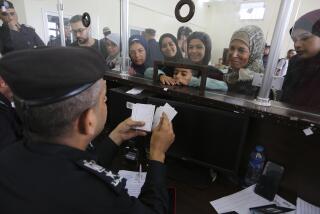Child, 10 Other Americans Out of Iraq; Hundreds Still There : Refugees: About 3,000 U.S. citizens are still in Kuwait after the invasion.
- Share via
AMMAN, Jordan — Eleven Americans, including a 10-year-old California girl who was stranded on an airline flight that stopped in Kuwait, arrived in Jordan on Saturday after days of frustration in getting permission to leave Iraq.
Except for the child, Penelope Nabokov, of Albany, Calif., the Americans are relatives of diplomats who live in Baghdad and two members of the embassy staff there. Jonathan Owen, a spokesman for the U.S. Embassy in Amman, said that efforts were under way to get more Americans out of Iraq and neighboring Kuwait, which was annexed by Iraq after a lightning invasion 10 days ago.
The 11 arrived at the Regency Hotel in Amman after a three-day trip from Baghdad and were scheduled to fly to Europe today. They declined to speak to reporters because of fatigue, Owen said. At her parents’ request, embassy personnel separated Nabokov from the group and took her into seclusion.
“They are tired but in good health,” Owen said as the 10 Americans stepped off an air-conditioned bus and entered the hotel. “They are delighted to be out.”
U.S. officials had announced a partial evacuation of the embassy in Baghdad on Wednesday, but Iraq blocked departures at its borders the same day. In all, about 30 family members and staffers were expected to try to leave, Owen said.
American diplomats with cars and a bus had waited all day Thursday and Friday at the Jordanian-Iraqi border post for the Americans to arrive. A bus that carried several Americans from Baghdad on Friday was turned back by Iraqi authorities at the frontier.
Upward of 500 American citizens remain in Baghdad, and an estimated 3,000 are still in Kuwait.
The Americans who arrived in Jordan brought with them luggage, including some household goods, and pets--two schnauzers and two cats.
In Washington, the State Department confirmed that the Americans had been permitted to cross the Iraqi border into Jordan but would not identify any member of the group other than Nabokov.
The departing diplomatic staff members were considered non-essential, and other embassy personnel are expected to remain at their posts as long as Washington maintains diplomatic relations with the Baghdad regime, the State Department said. U.S. policy regarding dependents in a situation such as the current Persian Gulf crisis is to repatriate them as quickly as possible.
A State Department spokeswoman said she could not say how many U.S. diplomats and dependents remain in Baghdad. The number was reported to be 25 to 30 when the crisis erupted, somewhat fewer than normal because of vacations.
Secretary of State James A. Baker III, after briefing President Bush at his summer home in Kennebunkport, Me., about his meeting with NATO allies Friday in Brussels, emphasized that the government does not consider Americans remaining in Iraq and Kuwait to be hostages.
“Nothing has been demanded or asked in connection with permitting them to leave the country, for one thing,” Baker told reporters. “And we think it would be a mistake to characterize it as a hostage situation and to use a word like that, since we are in discussions with respect to the matter. And, as far as we know, no American citizens have yet been mistreated.”
Baker said that U.S. officials are hopeful that the situation will be resolved. “It does, after all, run against all international norms, the fact that American citizens, and other foreign nationals as well, are not permitted to leave Iraq or to leave Kuwait,” he said.
In a prepared statement, the State Department said it was pleased that the 11 Americans were allowed to leave Iraq and that it would continue pressing for the release of other Americans in Iraq and Kuwait.
“We find their (Iraq’s) position on this issue unacceptable, and we have told the Iraqis so. We continue to press for the right of all Americans and other foreigners to leave who wish to do so,” the statement said.
“We continue to hold the government of Iraq responsible for the safety of Americans in Iraq and in Kuwait,” it continued. “Other nations have made the same point to Iraq. We continue to be in constant touch several times a day with the Iraqi Foreign Ministry on this issue.”
Nabokov’s father, Peter, said that his daughter was in “phenomenally good spirits” when he talked to her from his home in Albany, a suburb of Oakland.
“I asked her if she was OK, and she said, ‘Well, Dad, how would you feel if you had been driving across the desert for 72 hours?’ ” Nabokov told reporters in Albany.
Nabokov said he would fly to Paris today to meet his daughter and his wife, Isabelle, an archeologist who was on a field trip in India, where Penelope was originally to have met her.
The child, traveling alone on a British Airways flight from London, was taken into custody by Iraqi soldiers when the flight landed in Kuwait just after the invasion, taken to Baghdad and delivered to the U.S. Embassy there.
Daniel Williams reported from Amman and Don Shannon from Washington. Times staff writer Caroline Decker, in Los Angeles, also contributed to this story.
More to Read
Sign up for Essential California
The most important California stories and recommendations in your inbox every morning.
You may occasionally receive promotional content from the Los Angeles Times.










